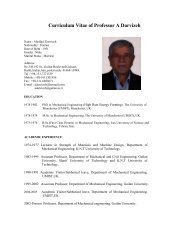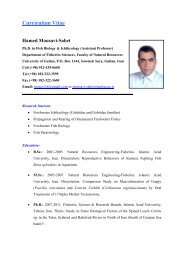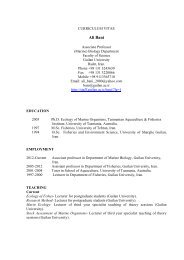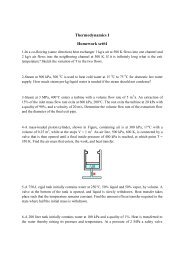Medical Tourism in Developing Countries
Medical Tourism in Developing Countries
Medical Tourism in Developing Countries
- No tags were found...
You also want an ePaper? Increase the reach of your titles
YUMPU automatically turns print PDFs into web optimized ePapers that Google loves.
Inequalities <strong>in</strong> Health Care ● 179adopted an Act of Parliament on Telemedic<strong>in</strong>e <strong>in</strong> 1997 that designated fivemajor hospitals to provide care to remote regions.However, by far the most important way <strong>in</strong> which medical tourism canenhance public health is through macroeconomic redistribution policy. Ascountries become globally competitive <strong>in</strong> medical tourism, <strong>in</strong>ternationalpatients help generate more taxable <strong>in</strong>come and profit. The result<strong>in</strong>g taxrevenue could be partially allocated for public health, namely for the<strong>in</strong>creased access, greater coverage, and improved quality of care for the localpopulation. In that way, medical tourism can provide a social benefit, andits growth and development can produce a positive externality. This is discussedbelow.F<strong>in</strong>anc<strong>in</strong>g Public HealthAccord<strong>in</strong>g to the Alma Ata Declaration, primary health care <strong>in</strong>cludes at leastthe follow<strong>in</strong>g: “Education concern<strong>in</strong>g prevail<strong>in</strong>g health problems and themethods of prevent<strong>in</strong>g and controll<strong>in</strong>g them; promotion of food supply andproper nutrition; an adequate supply of safe water and basic sanitation;maternal and child health care, <strong>in</strong>clud<strong>in</strong>g family plann<strong>in</strong>g; immunizationaga<strong>in</strong>st the major <strong>in</strong>fectious diseases; prevention and control of locallyendemic diseases; appropriate treatment of common disease and <strong>in</strong>juries; andprovision of essential drugs.” 33 Provid<strong>in</strong>g basic medical care has proven to bequite difficult. It is like any public good—everyone wants it, but no onewants to provide it. Supply<strong>in</strong>g medical care to the poor who have no abilityto pay for it is not a profit-generat<strong>in</strong>g activity. As a result, basic health is oftenthe focus of charities, NGOs, and corporations wish<strong>in</strong>g to make a difference.While many of those efforts have been successful, many are too <strong>in</strong>consistent,unsusta<strong>in</strong>able, and limited <strong>in</strong> scope to have a broad impact. Therefore, theresponsibility for provid<strong>in</strong>g basic public health rests with governments.Government is <strong>in</strong> the best position to f<strong>in</strong>ance basic health care thatreaches the maximum number of people, and then to implement thathealth care through its primary care network. Macroeconomic policy, specificallyfiscal policy that redistributes <strong>in</strong>come through taxes, can play acrucial role <strong>in</strong> the government’s ability to provide access to quality preventive,curative, and rehabilitative health care at the local levels.In develop<strong>in</strong>g countries, where many press<strong>in</strong>g problems compete forscarce funds, what is the source of resources that might aid public health?For some countries, the answer is medical tourism.Siphon<strong>in</strong>g funds from high-growth sectors or <strong>in</strong>dustries <strong>in</strong> order to payfor health care is hardly a novel idea. The World Bank has imposed a
















